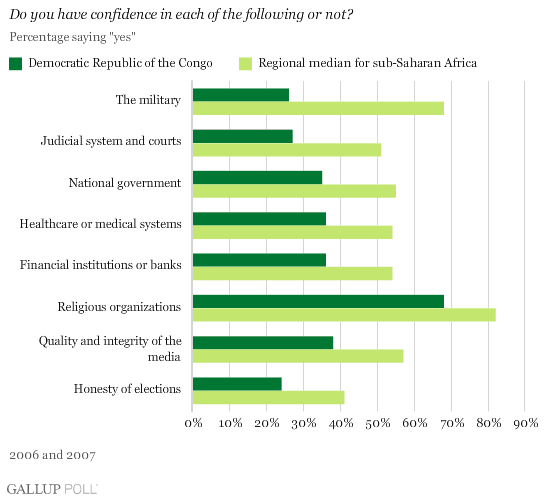WASHINGTON, D.C. -- A ���۴�ýPoll conducted one year after the Democratic Republic of the Congo (Congo - Kinshasa) conducted its first democratic national elections shows that, except for religious organizations, few Congolese respondents express confidence in their country's social and political institutions.

For the first time since Belgian colonial rule ended almost 50 years ago, Congolese went to the polls in July 2006 to elect their president and members of the National Assembly. After years of political turmoil and armed conflict, it is not surprising that relatively low percentages of Congolese respondents expressed confidence in their national institutions. But in the fragile post-election environment, where the focus is on anchoring the peace process and rebuilding state institutions, Gallup's findings, based on a survey conducted in Congo - Kinshasa's urban areas, provide a baseline against which change in public confidence can be measured going forward.
Of the institutions tested in the survey, only religious organizations elicit confidence from a majority of respondents in Congo - Kinshasa (68%). But this relatively high percentage still lags behind the regional median of 82%, which was calculated across 31 sub-Saharan African countries and where religious organizations usually garner the highest level of public confidence.
Despite isolated cases of violence and irregularities during the historic 2006 election, independent observers declared the elections to be free and fair. But ���۴�ýfindings show that just 24% of urban Congolese express confidence in the honesty of elections, well below the regional median score of 41%.
Congolese respondents report similar levels of confidence in the media (38%), financial institutions (36%), the healthcare system (36%), and the national government (35%). However, such trust in each of those four institutions trails the regional median scores by at least 18 percentage points. Those surveyed in Congo - Kinshasa are also far less likely than respondents across the sub-Saharan African region to express confidence in their judiciary, 27% compared with a regional median score of 51%. The opinions of Congolese respondents and residents across the sub-Saharan region differ most in regard to trust in the armed forces. Just 26% of urban Congolese, compared with a regional median score of 68%, say they have confidence in their military. After religious organizations, respondents across the sub-Saharan African region typically express the most confidence in the military.
The poll findings bring into sharper focus the critical need to build strong institutions in Congo - Kinshasa, especially in terms of the rule of law and participatory politics, to secure the peace process and political stability in the country.
Survey Methods
Results are based on face-to-face interviews with 1,000 adults, aged 15 and older, conducted in June 2007, in urban areas of the Democratic Republic of the Congo. The sub-Saharan African median scores are based on national samples, in most countries, of at least 1,000 adults, aged 15 and older, conducted in 2006 and 2007 in Angola (urban areas only), Benin, Botswana, Burkina Faso, Burundi, Cameroon, Central African Republic, Chad (excludes eastern region), Ethiopia, Ghana, Kenya, Liberia, Madagascar, Malawi, Mali, Mauritania, Mozambique, Namibia, Niger, Nigeria, Rwanda, Senegal, Sierra Leone, South Africa, Sudan (excludes Darfur), Tanzania, Togo, Uganda, Zambia, and Zimbabwe. For results based on the total sample of national adults, one can say with 95% confidence that the maximum margin of sampling error is ±5 percentage points. In addition to sampling error, question wording and practical difficulties in conducting surveys can introduce error or bias into the findings of public opinion polls.